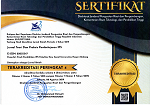Liveworksheet-based e-LKPD: an evaluation of a workshop aiming to improve Social studies teachers' pedagogical competence
Abstract
Teachers often present monotonous teaching and learning processes and use conventional assignments through LKPD (student worksheets) during a pandemic. The manual assessments take time and effort. Departing from that problem, UM Social Sciences Education Lecturer Team organized a workshop on liveworksheet-based e-LKPD (electronic LKPD) as a form of community service. This Program aims to improve the pedagogic competence of teachers. A series of activities have been carried out, and evaluation actions are needed in this workshop activity. The purpose of writing this article is to evaluate the workshop using the CIPP evaluation model, namely context evaluation, input evaluation, process evaluation, and product evaluation. The results of data analysis using CIPP show that the percentage value of the evaluation of the Liveworksheet-based E-LKPD Workshop for improving the pedagogic competence of Social Science teachers in Malang is Very Good. This value indicates that the implementation of the community service that has been carried out has a very well-implemented system.
Keywords
Full Text:
PDFReferences
Arifa, F. N. (2020). Tantangan Pelaksanaan Kebijakan Belajar dari Rumah dalam Masa Darurat Covid-19. Info Singkat: Kajian Singkat Terhadap Isu Aktual Dan Strategis, 7(1), 13-18.
Djuanda, I. (2020). Implementasi Evaluasi Program Pendidikan Karakter Model CIPP (Context, Input, Process dan Output). Al Amin: Jurnal Kajian Ilmu dan Budaya Islam, 3(1), 37-53. https://doi.org/10.36670/alamin.v3i1.39
Handayani, S., Minarti, W. S. U., & Megasari, R. (2020). Buku Ajar Strategi Pembelajaran Ekonomi Model-model Pembelajaran Inovatif di era Revolusi Industri 4.0. Edulitera.
Mahmudi, I. (2011). CIPP: Suatu Model Evaluasi Program Pendidikan. Jurnal At-Ta’dib. 6(1), 111-125. https://ejournal.unida.gontor.ac.id/index.php/tadib/article/view/551
Putra, A. K., Sumarmi, S., Handoyo, B., Fajrilia, A., Islam, M. N., & Attamimi, M. R. (2022). Pengaruh Digital Learning and Digital Games Training terhadap Kompetensi Technological Pedagogical Content Knowledge Guru SMA. Jurnal Praksis dan Dedikasi Sosial (JPDS), 5(1), 14-20. https://doi.org/10.17977/um032v5i1p14-20
Putra, G. Y. M. A., & Agustiana, I. G. A. T. (2021). E-LKPD Materi Pecahan dalam Pembelajaran di Sekolah Dasar. 9(2), 220-228. https://doi.org/10.23887/jjpgsd.v9i2.35813
Stufflebeam, D. L. (2015). The CIPP Evaluation Model: How to Evaluate for Improvement and Accountability. Western Michigan University.
Sudijono, A. (2013). Pengantar Evaluasi Pendidikan. PT. Raja Grafindo Persada.
Suyamto, J., Masykuri, M., & Sarwanto, S. (2020). Analisis Kemampuan TPACK (Technolgical, Pedagogical, And Content, Knowledge) Guru Biologi SMA dalam Menyusun Perangkat Pembelajaran Materi Sistem Peredaran Darah. INKUIRI: Jurnal Pendidikan IPA, 9(1), 44-53. https://doi.org/10.20961/inkuiri.v9i1.41381
Tayibnapis, F. Y. (2008). Evaluasi Program dan Instrumen Evaluasi untuk Program Pendidikan dan Penelitian. Rineka Cipta.
Turmuzi, M., Ratnaya, I. G., Al Idrus, S. W., Paraniti, A. A. I., & Nugraha, I. N. B. S. (2022). Literature Review: Evaluasi Keterlaksanaan Kurikulum 2013 Menggunakan Model Evaluasi CIPP (Context, Input, Process, dan Product). Jurnal Basicedu, 6(4), 7220–7232. https://doi.org/10.31004/basicedu.v6i4.3428
Wiradimadja, A., Ratnawati, N., Kurniawan, B., Yaniafari, R. P., & Alivi, J. S. (2021). Screen Recorder for Guiding Distance Learning: Case Study of Teacher Professional Education Program. International Journal of Emerging Technologies in Learning (IJET), 16(07), 4-15. https://doi.org/10.3991/ijet.v16i07.21173
Wulansari, R. D., & Nuryadi, N. (2022). Efektivitas Penggunaan E-LKPD Berbasis Problem Based Learning Untuk Meningkatkan Kemampuan Pemahaman Konsep Peserta Didik. Jurnal Pendidikan Dan Konseling (JPDK), 4(4), 338-344. https://doi.org/10.31004/jpdk.v4i4.5391
Yaniafari, R. P., Rihardini, A. A., & Wiradimadja, A. (2021). Undergraduates' Perception on their English Learning Process: Preliminary Step toward "Foundations of Social Studies" CLIL-Based Material Development. Asian Journal of University Education, 17(4), 49-59. https://doi.org/10.24191/ajue.v17i4.16210
Yaniafari, R. P., & Rihardini, A. A. (2021). Face-To-Face or Online Speaking Practice: A Comparison of Students' Foreign Language Classroom Anxiety Level. Journal of English Education and Linguistics Studies (JEELS), 8(1), 49–67.
Zhang, G., Zeller, N., Griffith, R., Metcalf, D., & Misulis, K. (2011). Using the Context, Input, Process, and Product Evaluation Model (CIPP) as a Comprehensive Framework to Guide the Planning, Implementation, and Assessment of Service-learning Programs. Journal of Higher Education Outreach and Engagement, 15(4), 57-84.
DOI: http://dx.doi.org/10.17977/um022v8i12023p24
Refbacks
- There are currently no refbacks.
Editorial and Administration Office:
This Journal is published by Prodi Pendidikan IPS, Fakultas Ilmu Sosial, Universitas Negeri Malang
Semarang St. No. 5 Building I3-102 65145.
Phone. (0341) 551312. line. 376 (19)
Homepage: http://journal2.um.ac.id/index.php/jtppips/index
email: jtp2ips.journal@um.ac.id
JTP2IPS INDEXED BY:
e-ISSN 2503-5347
ISSN 2503-1201
JTP2IPS is licensed by CC BY 4.0.










